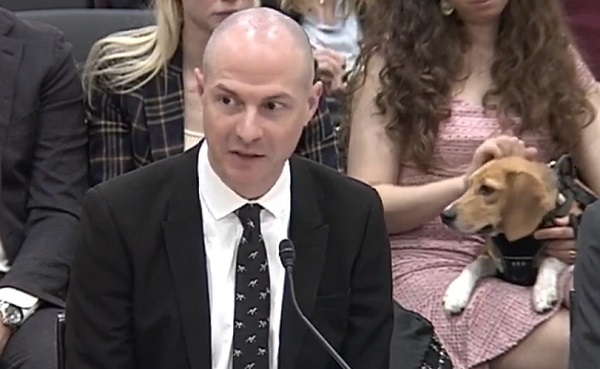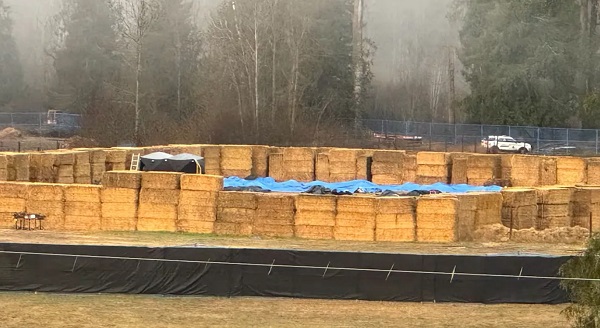Business
Dr. Fauci accused of wasting millions in taxpayer dollars on ‘transgender animal experiments’

From LifeSiteNews
The days of animal testing may be numbered, having been found to be less reliable than other methods of research.
Experts speaking at a Republican-led congressional hearing revealed the shocking news that at least $10 million had been wasted by government health agencies on “transgender animal testing” and that the number was likely closer to a quarter billion dollars or more.
Justin Goodman, senior vice president of the White Coat Waste Project, shed light on the exorbitant waste of American tax dollars on barbaric animal research that has prioritized woke societal trends over scientific outcomes.
“In our analysis, Dr. (Anthony) Fauci funded about 95% of the transgender animal experiments,” Goodman said.
Goodman told members of the Subcommittee on Cybersecurity, Information Technology, and Government Innovation, chaired by Republican Rep. Nancy Mace of South Carolina, that in his estimation $241 million has been spent on transgender animal testing, adding, “I would say that is the floor, not the ceiling because the information on federal databases is pretty incomplete.”
He described the nature of the transgender experimentation inflicted on the animals:
In a lot of these cases, there are involved mice, rats, monkeys who are being surgically mutilated and subjected to hormone therapies to mimic female to male, or male to female gender transitions … gender-affirming hormone therapies, and then looking at the biological, psychological, and physiological effects of the gender transitions, looking at the effects of taking vaccines after you’ve transitioned these animals from male to female or female to male, looking at the size of their genitals changing after you’ve put them on estrogen or testosterone therapies to transition them.
Rep. Mace explained – and Goodman confirmed – that “DEI grants” included “$1.1 million spent to find out if female rats receiving testosterone therapies to mimic transgender men were more likely to overdose on a party drug commonly used in the LGBTQ community to induce drug-fueled ‘chemsex.’”
Goodman said that the reason the public doesn’t know about these sadistic experiments is that “You essentially need a degree in information technology to navigate the federal spending databases to find any of this stuff.”
“It’s by design,” he added.
Fauci’s barbaric animal testing could lead to a new, deadly pandemic
Goodman went on to point his finger squarely at Dr. Fauci and his U.S.-funded virus research at China’s Wuhan lab and warned about dire future public health risks of continuing with outrageous animal studies.
“We’re flirting with disaster if we continue to fund dangerous virus research,” Goodman said, “like in Colorado where Fauci greenlit this bat lab.”
“They’re trying to import hundreds of bats from Asia (and) build a new lab in Colorado to do virus experiments with Ebola, Nipah, Lassa – deadly viruses for which there is no cure,” he explained.
“It’s just a matter of time before we have another pandemic on our hands if we let mad scientists run amok with our money,” Goodman warned.
Most of the 27 NIH institutes and centers conduct or support animal testing – as does the Food and Drug Administration, the U.S. Department of Agriculture, the Department of Veterans’ Affairs, the Department of Defense, and countless agencies.
Mace’s committee reported that the U.S. government spends in excess of $20 billion every year conducting experiments on animals.
The White Coat Waste Project found in 2021 that the National Institute of Allergy and Infectious Diseases, a component of NIH at the time run by Fauci, spent $1.68 million force-feeding toxic drugs to beagle puppies between six and eight months old before dissecting and killing them.
In 2022, due to public criticism lobbied against Fauci’s HIH by me and other members of Congress, another $1.8 million experiment to abuse beagle puppies in various drug tests was cancelled.
The days of animal testing may be numbered, having been found to be less reliable than other methods of research.
“Scientific progress has given us better tools for toxicology and biomedical research, making animal testing increasingly outdated,” said Dr. Paul Locke, a professor at Johns Hopkins Bloomberg School of Public Health who also testified at the hearing.
“Embracing these alternatives is a win-win,” Locke said. “It reduces animal use while providing data that better reflects human health.”
Business
Liberals refuse to disclose the amount of taxpayer dollars headed to LGBT projects in foreign countries

From LifeSiteNews
The Liberal government of Prime Minister Mark Carney will not openly disclose how much money from its foreign-aid budget is going toward overseas “gender identity” and “decolonization” projects.
According to the government, there are “concerns” that disclosing the amount of funds could endanger certain LGBT organizations that get money from it.
On November 3, Global Affairs Canada, in response to a question on the order paper from a Conservative MP, said that the funding amounts could not be made public due to claimed “security concerns” and “confidentiality requirements.”
“These are the most common reasons projects are considered sensitive: the organization or individuals might be in danger if it becomes known that they are receiving funds from a foreign government; (or) implementing a project related to sensitive topics such as two-spirit, lesbian, gay, bisexual, transgender, queer, intersex and additional sexually and gender-diverse people rights, human trafficking, early/forced marriage, (and) human rights defenders,” Global Affairs noted.
Continuing, Global Affairs said that there is a possible “danger” to partner organizations that could be “forced to close” or even “arrested” due to “harassment from the local population or government.”
As reported by LifeSiteNews, Carney’s budget will include millions in taxpayer money for “SLGBTQI+ communities,” gender equality, and “pride” safety.
Canada’s 2025 federal budget is allotting some $54.6 million to LGBT groups in a move criticized by Campaign Life Coalition as prioritizing activist agendas over struggling families’ basic needs.
Canadian taxpayers are already dealing with high inflation and high taxes due in part to the Liberal government overspending and excessive money printing, and even admitting that giving money to Ukraine comes at the “taxpayers’” expense.
As recently reported by LifeSiteNews, Bank of Canada Governor Tiff Macklem gave a grim assessment of the state of the economy, essentially telling Canadians that they should accept a “lower” standard of living.
Business
Carney’s Floor-Crossing Campaign. A Media-Staged Bid for Majority Rule That Erodes Democracy While Beijing Hovers

In a majority government, an unprecedented and risky, course-altering national policy — deepening ties with Beijing while loosening ties with Washington — is considerably easier to execute.
On budget day, Ottawa’s reporters were sequestered in the traditional lock-up, combing through hundreds of pages, when Politico detonated a perfectly timed scoop: Conservative MP Chris d’Entremont was weighing a jump to Mark Carney’s Liberals. Within hours, he crossed, moving the government to within two seats of a majority — one that would guarantee Carney’s hold on power until 2029 — without Canadians casting a single ballot.
This was no ordinary budget day. By orchestrating a floor-crossing during a media lock-up, the Liberals blurred scrutiny of a historic spending plan while inching toward a de facto majority. That sequence raises deeper concerns about media–political entanglements and the democratic legitimacy of building a majority outside the polls.
Toronto Sun columnist Brian Lilley, in a deeply reported Substack post yesterday, captured months of palace intrigue. A well-sourced politics reporter with lines into Conservatives and Liberals alike, he lays out the knowns, the known unknowns, and the plausible backroom plays. Carney’s courting began right after the April 28 election that left him sitting at 169 seats, Lilley writes. For weeks, the Liberals probed for weak ribs in the Conservative caucus; and on November 4, they landed one.
“One thing is clear, the Liberals have been trying to poach a lot of Conservative MPs and doing everything they can to convince them to cross the floor,” he concluded.
Why? According to Lilley, Carney has been “governing for the most part like he has a majority, and he clearly doesn’t want to engage in the horse trading that a minority Parliament requires, so poaching MPs can solve his problem.”
The fallout was already clear to see last week. And it doesn’t look good for Canadian democracy or Canadian media, which receives significant government subsidies. Even at surface level, the press corps was visibly distracted from its first duty to citizens: scrutinizing a historically large budget packed with nation-building promises and unanswered questions about feasibility. Veteran reporters have already acknowledged this.
In another piece this weekend, Catherine Tunney, a solid CBC reporter, explained how Pierre Poilievre was undermined this way: “For the Opposition, budget week is a communications gift. It’s an easy way for the party to call out government spending,” she wrote. “For a leader who has built his brand on calling out Liberal spending, tabling a budget with a $78-billion deficit is the political equivalent of pitching a strike straight down the middle to Dodger slugger Shohei Ohtani.”
But instead, “of taking a victory lap around the bases, [Poilievre] ended the week facing questions about his leadership — after losing one MP to his rivals and another resigning from federal politics altogether.”
The messaging continued yesterday, with another CBC report amplifying the Liberals’ narrative that Conservative leaders were actively bullying MPs not to cross.
CBC had to issue a correction. After publishing d’Entremont’s account that senior Conservatives “pushed” his assistant, CBC later updated the story to clarify that Andrew Scheer and Chris Warkentin “pushed open the door,” and the aide stepped aside — a meaningful distinction.
Stepping back from the noise, there is a deeper problem.
Making honeyed promises to floor-crossers is legal in Canada’s democracy. But Canada is in a mounting trade war involving China and the United States, in an increasingly dangerous, cutthroat geopolitical environment. Already, the prime minister is pledging renewed engagement with Beijing as a strategic partner.
Doing so in a minority Parliament means facing tough accountability questions — and bruising inquiries in ethics committee hearings. In a majority government, an unprecedented and risky, course-altering national policy — deepening ties with Beijing while loosening ties with Washington — is considerably easier to execute.
And what kind of partner is Carney choosing? Yesterday, Japan lodged formal complaints after a senior Chinese diplomat took to social media and threatened to “cut [the] dirty neck” of Japan’s new leader over her stance on Taiwan. On Friday, Prime Minister Sanae Takaichi had said a Chinese attack on Taiwan could constitute “a survival-threatening situation” for Japan, potentially requiring the use of force.
“We have no choice but cut off that dirty neck that has been lunged at us without hesitation. Are you ready?” Chinese Consul General Xue Jian said in a message posted on X, which was later deleted.
This is the government Carney is rapidly sliding closer to. The same regime that jailed Canadians Michael Kovrig and Michael Spavor in the Meng Wanzhou affair — and a government that, Canadian intelligence has warned, attempts to shape media narratives in Canada.
As The Bureau reported in 2023, Canada’s own Privy Council Office warned in a January 2022 Special Report that Beijing’s United Front Work Department targets Canadian institutions.
In a section alleging Beijing “manipulates traditional media” in Canada, the report details press conferences held in January 2019 by former Toronto-area Liberal cabinet minister John McCallum, to argue that Canada’s detention of Huawei executive Meng Wanzhou was illegal. McCallum, then ambassador to China, was forced to resign after the Conservative opposition condemned his comments.
In the fallout, according to the Privy Council Office report, Canadian intelligence uncovered that several Chinese diplomats in Canada were voicing support for McCallum. One Chinese consulate official “sent information” to an unidentified Canadian media reporter indicating Chinese Canadians have favourable impressions of McCallum, the report says.
Now back to Ottawa media’s role. Why and how did Politico get the floor-crossing scoop during the budget lock-up — and then, that same evening, co-host a post-budget reception branded “Prudence & Prosecco” at the Métropolitain Brasserie, where Finance Minister François-Philippe Champagne and well-placed Liberals mingled with reporters? Every veteran reporter knows political parties try to influence the press — they’re called spin doctors for a reason. But darker forces can ride the same channels. In Brussels, for example, European security services are investigating a former Politico reporter over alleged ties to Chinese intelligence — still unproven, but a cautionary tale about the murkiness of media–political ecosystems.
Lilley also documents how coverage of another rumoured floor-crosser, Matt Jeneroux, became part of last week’s fog machine. The Toronto Star reported a private meeting between Jeneroux and Carney involving senior Liberal strategists Braden Caley and Tom Pitfield; Jeneroux issued categorical denials to senior Conservatives. “Someone is lying,” Lilley writes — and whether or not a second crossing was imminent, the destabilization served its purpose. Other names floated, such as Michael Chong, were so implausible as to raise suspicion of calculated disinformation.
“I didn’t buy Chong either, but Liberals kept pushing that narrative,” Lilley wrote. “As someone who knows Michael a bit, I simply didn’t believe it, didn’t even reach out to ask — he later called me to confirm the rumours were bogus.”
It is geopolitically notable that Michael Chong — sanctioned by Beijing and repeatedly targeted in PRC pressure campaigns, including a Chinese intelligence operation targeting Chong and his family that Justin Trudeau’s government failed to notify him about — saw his name tossed into this mess. Who benefits from saddling Chong with corrosive rumours?
It would seem that not only the Liberals benefit, but so do Carney’s new “strategic partners” in Beijing. None of this proves any newsroom has wittingly acted in bad faith, nor is there any evidence that Beijing’s shadow looms in the Liberals’ media playbook. But it does suggest how a coordinated political operation can be abetted by domestic media distraction.
Now, consider darker possibilities that could be in play. Not necessarily last week, but in any number of major events and stories shaping relations among Canada, China, and the United States.
The bipartisan NSICOP 2024 Review into allegations of Chinese election interference in Canada’s last two federal elections found that “during the period under review, the intelligence community observed states manipulating traditional media to disseminate propaganda in what otherwise appeared to be independent news publications.”
It added: “Foreign states also spread disinformation to promote their agendas and consequently challenge Canadian interests, which posed the greatest cyber-threat activity to voters during the time under review.”
The report continued: “These tactics attempt to influence public discourse and policymakers’ choices, compromise the reputations of politicians, delegitimize democracy, or exacerbate existing frictions in society.”
According to the intelligence community, “the PRC was the most capable actor in this context, interfering with Canadian media content via direct engagement with Canadian media executives and journalists.”
So what do we have here? Carney’s Liberals have a natural interest in destabilizing the Conservatives and sending Pierre Poilievre — a prosecutorial-style politician who excels at exposing his opponents’ weaknesses — into early political retirement. Arguably, they have a well-founded interest in dividing the Conservative Party itself.
But using the media to float names of opposition MPs who never intended to cross is disinformation, plain and simple. And when that name is Michael Chong — long targeted by Beijing — the stakes rise. If Carney is tilting toward a “strategic partnership” with Beijing, and if that delays the Foreign Influence Transparency Registry, as critics such as Dr. Charles Burton warn, then the tactics on display have moved from questionable to unacceptable — and risk entangling the interests of the Liberal Party of Canada with those of the Chinese Communist Party in Beijing.
The Bureau is a reader-supported publication. To receive new posts and support my work, consider becoming a free or paid subscriber.
-

 armed forces9 hours ago
armed forces9 hours agoIt’s time for Canada to remember, the heroes of Kapyong
-

 International2 days ago
International2 days agoBBC uses ‘neutrality’ excuse to rebuke newscaster who objected to gender ideology
-

 Agriculture2 days ago
Agriculture2 days agoThe Canadian Food Inspection Agency’s Bloodlust: Worshipping Policies While Ignoring Science
-

 Agriculture2 days ago
Agriculture2 days agoThe Canadian Food Inspection Agency’s Bloodlust for Ostriches: Part 2
-

 Housing1 day ago
Housing1 day agoTrump advancing 50-year mortgage to help more Americans buy homes
-

 Agriculture2 days ago
Agriculture2 days agoWas The Ostrich “Cull” A Criminal Act?
-

 International1 day ago
International1 day agoBBC boss quits amid scandal over edited Trump footage
-

 Frontier Centre for Public Policy2 days ago
Frontier Centre for Public Policy2 days agoNotwithstanding Clause Is Democracy’s Last Line Of Defence








